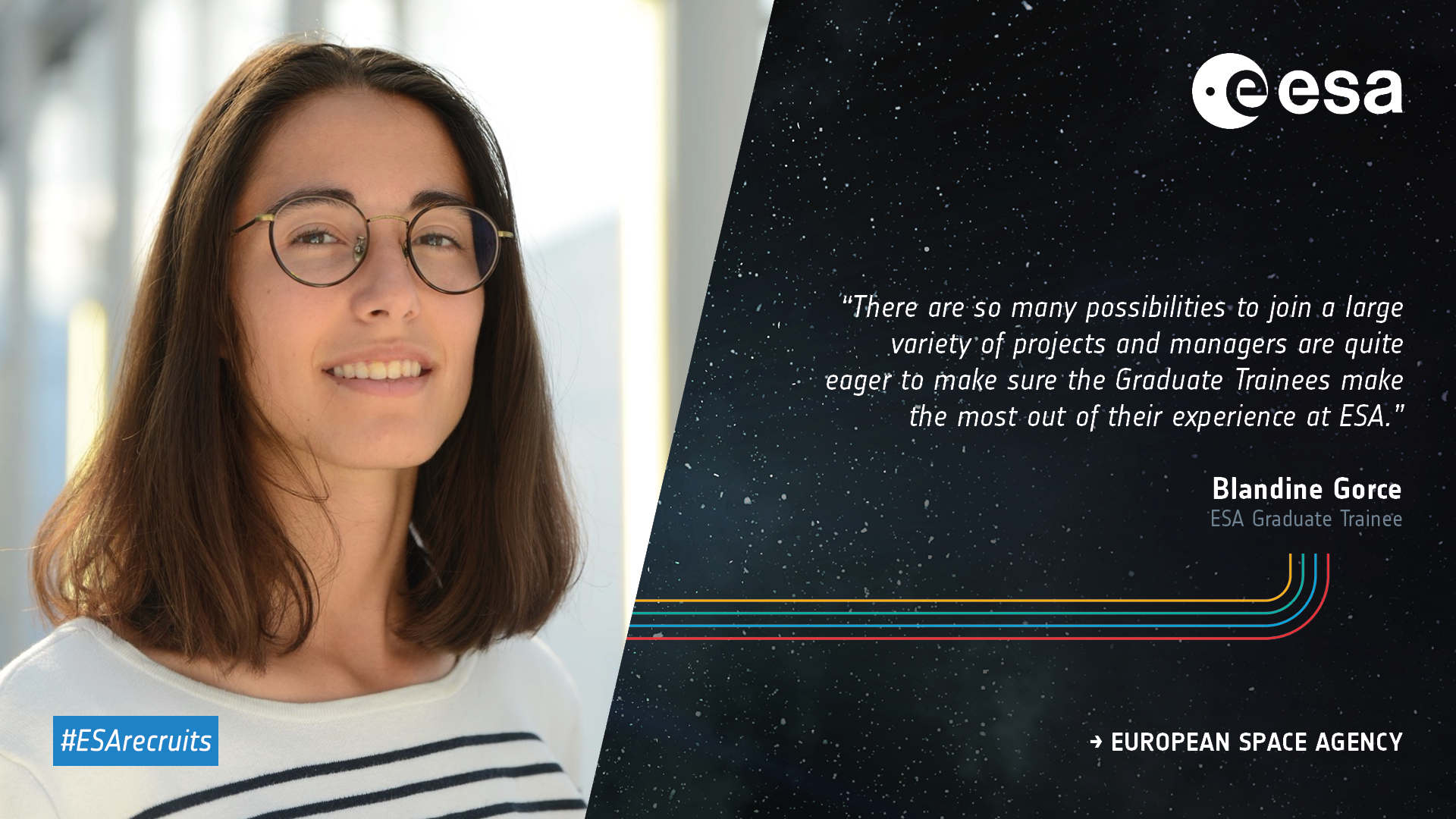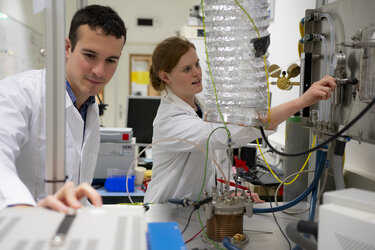I'm an ESA YGT and I work with Life Support Systems
Each year in February, the European Space Agency opens its call for applications for its Young Graduate Trainee Programme! Opportunities are now available in engineering, science, IT and business services.
The programme offers recently graduated Master’s students a unique opportunity to work on inspiring space missions at the heart of European space activities. Young Graduate Trainees will join our team of scientists, engineers and business professionals from all over Europe working together in an international and friendly environment.
In this edition we interview Blandine Gorce, who joined us in November 2022 as a Young Graduate Trainee in Life Support Systems. Blandine will share with us her experience working as a YGT at ESA and her current activities supporting the Micro-Ecological Life Support System Alternative (MELiSSA) project team on systems aspects and terrestrial applications.

Tell us a little about yourself, e.g. your university studies, any internships you have carried out
As someone who is passionate about space exploration, I studied aerospace engineering at the French engineering school ISAE-Supaero. I had the opportunity to complete several internships and projects on a wide variety of topics during my studies. I first started with an internship at IRAP on the modelling of Coronal Mass Ejection in the solar corona. After a semester at Politecnico di Milano, I completed an internship in biomedical engineering in a French start-up company. In my last year of studies, the topic of life support systems sparked my interest in space exploration and biomedical sciences and I completed my internship at ESA with the MELiSSA project. I am now a YGT in the same team and have been working at ESA for almost two years.
What encouraged you to apply to become an ESA YGT?
I applied to be a YGT at ESA because, as an aerospace engineer, I saw it as a great opportunity for a first job to understand better how ESA and the European space industry work and to get a good overview of the projects that are developed in life support systems. I was of course also attracted by the international environment and the prospect of meeting other space enthusiasts from all over Europe. As I had also done an internship at ESA before, I thought six months were quite short to take advantage of all of ESA’s benefits and I wanted to get more time to work on the fascinating topics I was working on as an intern.
What does your work at ESA entail?
I am working in the Life Support and Physical Sciences Instrumentation section. In that section, I mainly support the MELiSSA project regarding systems aspects and terrestrial applications. This entails modelling of circular life support systems in MATLAB for the sizing studies of several mission scenarios for one part and expert support, project review and management for the terrestrial applications part. This involves my participation in a very wide range of projects, from technology implementation to meetings with the international stakeholders to discuss more strategic aspects. I also had the possibility to participate in interesting Concurrent Design Facility (CDF) preliminary design studies on some topics related to my work.

What is working at ESA like for you?
Working at ESA is quite enjoyable since I am able to participate in a lot of different activities and my supervisors are really supportive of any initiative to help me make the most out of my time at ESA. My team gathers people with various profiles, from microbiology to aerospace engineering, and it is a great source of learning for me to work in this environment. Everyone at ESA is always very eager to help YGTs in their work and it triggers a lot of discussions with experts from any field.
Can you tell us more about life at ESTEC?
At ESA, the work environment is pretty great. The diversity in cultures and the topics people are working on is a source of learning and discoveries. There are also a lot of talks and conferences organised on site, which fosters many interesting discussions with experts. Additionally, the Young ESA community is very active on many topics, and it is possible to get involved in interesting side projects as most managers are encouraging of new projects and ideas. Not to mention that the social life at ESTEC in particular is amazing: the campus is equipped with a lot of sport and outdoor facilities for after-work time and social gatherings, which makes it easier to meet colleagues and definitely contributes to creating a pleasant work environment. I take part in the volleyball club and was able to join several initiatives such as the Young ESA sustainable group and the YPSat2 initiative. Thanks to this great community of young professionals, it is quite easy to find friends and feel at home in the new country.
What is your best memory so far as a YGT?
I really enjoyed the CDF study experiences. It is a great opportunity to discover early-stage mission development and see how experts from all topics come together to discuss and prepare future missions. And the rooms are quite impressive!
What has been the biggest challenge for you?
I think the biggest challenges for me were at the beginning to be able to understand how ESA works and how the different teams work together. There are so many different teams in different departments and divisions that it was sometimes hard to find who to talk to in order to get the information that I needed for my work.
What advice do you have for our readers who might be interested in pursuing a career in life support systems at ESA?
I would say it is important to try to understand how ESA works a little bit before applying to be sure to apply for a team that is working on something of interest to you. Depending on the directorate in which your traineeship will be, you might have access to different types of activities. I would also recommend getting in touch with previous YGTs or people working at ESA, as it can be quite helpful to understand the work they are doing and everyone is often very welcoming and happy to talk about their job. ESA is a great way to start a space career and I would recommend applying to work there, even for a short time, to get a better understanding of the mechanics behind the European space sector.

Want to learn more?
Find detailed information on the Young Graduate Trainee Programme and answers to your most common questions on the dedicated FAQ page. Check out this page to discover other programmes available at ESA!
Life at ESA
Learn more about life at ESA, work-life balance, or visit our ESA establishment pages to learn more about our working life.
Stay connected with us!
Join us on our Careers website and subscribe to our careers news.
Follow us on LinkedIn.















 Germany
Germany
 Austria
Austria
 Belgium
Belgium
 Denmark
Denmark
 Spain
Spain
 Estonia
Estonia
 Finland
Finland
 France
France
 Greece
Greece
 Hungary
Hungary
 Ireland
Ireland
 Italy
Italy
 Luxembourg
Luxembourg
 Norway
Norway
 The Netherlands
The Netherlands
 Poland
Poland
 Portugal
Portugal
 Czechia
Czechia
 Romania
Romania
 United Kingdom
United Kingdom
 Slovenia
Slovenia
 Sweden
Sweden
 Switzerland
Switzerland






























